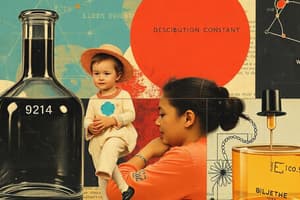Podcast
Questions and Answers
What does dissociation refer to?
What does dissociation refer to?
- A form of mental harmony
- The occurrence of mutually consistent ideas
- The occurrence of mutually inconsistent ideas that remain isolated (correct)
- A psychological disorder
What is the definition of automatic systems?
What is the definition of automatic systems?
Jerry's automatic or less conscious mind makes associations that influence his thoughts, feelings, and behavior.
What characterizes reflective systems?
What characterizes reflective systems?
The reflective side of the mind is conscious and believes there is nothing wrong with being gay.
What are automatic preferences?
What are automatic preferences?
What does dissonance describe?
What does dissonance describe?
What is cognitive dissonance?
What is cognitive dissonance?
How does laughter relate to our feelings according to Lynch's findings?
How does laughter relate to our feelings according to Lynch's findings?
Flashcards are hidden until you start studying
Study Notes
Key Concepts in Chapter 4
-
Dissociation
- Involves conflicting ideas existing within the same mind, remaining isolated from each other.
- Example: A gay activist may hold both positive and negative associations regarding homosexuality.
-
Automatic Systems
- Refers to the subconscious mind's role in forming cultural associations, like linking homosexuality to sinfulness.
- These automatic responses can shape thoughts, feelings, and behavior without awareness.
-
Reflective Systems
- Represents the conscious side of the mind, which can embrace progressive views on issues such as homosexuality.
- A person may genuinely believe in gay rights while still internalizing negative cultural views from their upbringing.
-
Automatic Preferences
- Implicit feelings and thoughts that guide actions, often without clear explanation.
- These preferences may conflict with conscious intentions, leading to inconsistencies in behavior.
-
Dissonance
- Describes situations where conflicting beliefs or perceptions occur, whether consciously recognized or not.
- Can encompass both awareness of conflict and situations where the conflict is outside of conscious thought.
-
Cognitive Dissonance
- The discomfort felt when recognizing contradictions between beliefs and actions, or between competing beliefs.
- Highlights a natural human desire for mental harmony.
-
Does Laughing Matter?
- Research indicates that strong automatic preferences can influence reactions to humor, particularly regarding race.
- Laughter serves as an authentic emotional response, revealing underlying feelings about stereotypes and social norms.
Studying That Suits You
Use AI to generate personalized quizzes and flashcards to suit your learning preferences.



